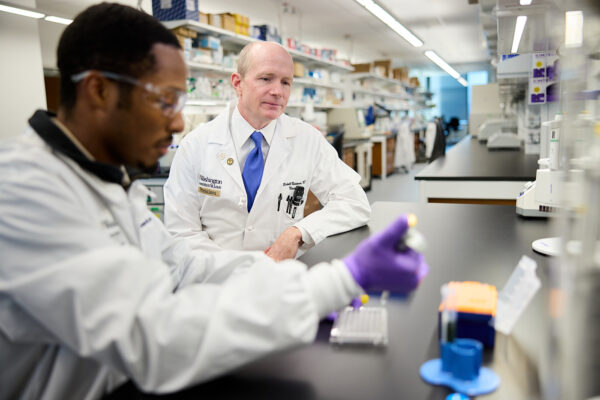College-educated workers drive innovation and economic development and contribute significantly to a city’s overall prosperity. With more than a dozen colleges and universities, St. Louis has no shortage of talented students. But keeping that talent in St. Louis after graduation remains a challenge.
Attracting and retaining talent in the St. Louis community is a key priority of Washington University’s “In St. Louis, for St. Louis” initiative. The university recently commissioned a report from Olin Business School’s Center for Analytics and Business Insights that details which type of students are most likely to stay in St. Louis after graduation, as well as the factors that drive students’ decisions in choosing their first jobs.
The report also highlights initiatives or incentives that could encourage students to stay in St. Louis and strategic investment opportunities for university and community partners to make St. Louis more attractive to college graduates.
WashU will host a conference, “Data for Good: Attracting and Retaining Talent in St. Louis,” from 8:30 a.m. until noon Wednesday, Oct. 9, for local business, academic and community leaders to discuss the report’s insights and next steps forward. The conference promises to be a pivotal event that will shape the region’s future, according to WashU Chancellor Andrew D. Martin.
“Attracting and retaining world-class talent to the St. Louis region is one of our top priorities at WashU because when St. Louis wins, we all win,” Martin said. “Over the last five years, we’ve made significant investments toward this goal through our Heartland Initiative, revamped School of Continuing & Professional Studies and increased funding for St. Louis startups, for example.
“Now is the time for WashU and our community and business partners to work together to make a transformative impact on the region. The data-driven insights from this report offer a clear path forward.”
Joe Blomker, CEO of Maryville Consulting Group; Maxine Clark, chief inspirator of Delmar Divine and founder and former chief executive bear, Build-A-Bear Workshop; Sam Fiorello, CEO of Cortex; Norma Guerra Gaier, WashU associate vice chancellor for career development and education; Jason Hall, CEO of Greater St. Louis Inc.; Missouri Sen. Brian Williams and others will join Martin for the half-day conference.
In addition to the report findings, panelists will discuss the vital role that a robust talent ecosystem plays in driving regional growth and competitiveness; how to build and sustain a thriving talent ecosystem; and opportunities for collaboration.
Salary is key, but not only influential factor
Before university and community leaders can address how to retain college graduates, they needed to understand why they choose to stay or leave in the first place, said Michael Wall, co-director of the Center for Analytics and Business Insights and a professor of practice, marketing and entrepreneurship at Olin.
“Our research provides data-driven insights into why students make choices and how they weigh different factors. It creates an opportunity for our community to make pragmatic and strategic decisions about how to retain talent, and it can be used by WashU and others to continuously learn from our students,” he said.
Wall and his colleagues first conducted a series of interviews and focus groups with WashU students to uncover personal and practical factors influencing their decisions about where to work after graduation.
Overwhelmingly, students said salary was the most important factor in their job and relocation decisions. Social connections — including friends and community — and opportunities for professional advancement also factored high into their decision making.
‘We’re well-positioned to win with these students, and achieving this is more about education and awareness than major investment.’
Michael Wall
Next, they conducted a larger survey study with 174 graduate and undergraduate WashU students in which they asked respondents to compare multiple job offers with differing factors including salary, company reputation, proximity to friends and family, cost of housing and more. This approach, they said, offered a more comprehensive, nuanced and accurate understanding of how students prioritize their job options.
While salary was still the most important factor for most students, the survey showed that factors such as cost of housing and proximity to friends and family also significantly influenced students’ decisions.
The survey also showed that offering competitive salaries can significantly increase the likelihood of students staying in St. Louis after graduation, even when they perceive other cities as more favorable in factors such as safety and weather.
Finally, the survey data also revealed subtle priority differences between students at different schools. For example, students at WashU’s McKelvey School of Engineering were more likely to prioritize proximity to family and housing after salary, while Olin Business School students prioritized company reputation, career opportunities and climate. Wall said this information would be useful in developing tailored retention strategies.
Good news, opportunities
“The good news is what makes St. Louis a great place to live aligns with what many students are seeking,” Wall said. “We’re well-positioned to win with these students, and achieving this is more about education and awareness than major investment.”
“That said, there are opportunities for improvement, and this research gives us greater precision in identifying where our community should focus those efforts.”
Wall said the university can make the biggest impact by focusing on what it can control — in particular, creating personalized and engaging experiences that guide students toward paths aligned with their personal and professional goals.
He also pointed to other cities, such as Philadelphia, that have worked in partnership with their local universities and businesses to retain college graduate talent.
“Campus Philly in Philadelphia is a great example of how a city can work in partnership with universities and local businesses to retain talent,” Wall said. “Through targeted initiatives, they’ve successfully built connections between students and local employers, which has helped increase the availability of high-paying jobs and internship opportunities.”
This collaborative approach between academic institutions, businesses and city leaders can serve as a model for St. Louis to create more competitive salaries and attract students to stay post-graduation, Wall added.
Register to attend the “Data for Good: Attracting and Retaining Talent in St. Louis” conference.


